Table of Contents
The Futility of ‘Banning’ Yik Yak on Campus

On college campuses across the country, students and administrators are debating banning Yik Yak, a mobile phone application that allows its users—frequently college students—to anonymously communicate with one another in a given area.
Yik Yak, like nearly all other means of communication, is a tool that can be abused. Just as Twitter attempts to grapple with concerns about harassment, some have used Yik Yak to post true threats—which are not protected by the First Amendment—and varying degrees of offensive and hurtful material, some of which, given the prevalence and importance of campus debates over racism, have targeted people of color.
Its creators, unprepared for the app’s rapid rise in popularity, have sought to implement methods to deter users from engaging in threatening (or otherwise abusive) speech. Yik Yak, in addition to prohibiting posts which are “offensive, threatening or demeaning to any individual or group,” employs both top-down and user-driven moderation systems: if an abusive message (in the eyes of Yik Yak) is posted, the company’s moderators may delete it in response to user complaints, but any post is deleted if five users vote it down. Additionally, Yik Yak will caution users who attempt to post a message with words commonly associated with threats—for example, “Pizza is the bomb”—that "Yik Yak and law enforcement take threats seriously" and asking the user whether they really want to post the message. And when threats are posted, Yik Yak voluntarily shares identifying information with law enforcement in emergencies or, in some cases, in response to a subpoena or warrant, which can lead to arrests.
Despite these efforts, some posts on Yik Yak have become flashpoints for campus activists, who occasionally call for their institutions to ban Yik Yak. In mounting this argument, proponents of banning Yik Yak often conflate the medium (Yik Yak, or anonymous speech generally) with some of the messages sent through that medium (true threats, for example).
But even leaving aside the question of whether a medium of speech should categorically be banned because it can (or even has) been abused, proponents must ask themselves a simpler question: Is it feasible to enact such a ban and, if so, is it worth the effort?
Unfortunately, the answers to these questions are only partially hypothetical. A number of institutions have banned Yik Yak, providing an opportunity to observe—at least subjectively—whether banning Yik Yak has any utility. This was the question that the University of Rochester recently struggled to answer, with a panel overwhelmingly urging the president to ban Yik Yak—and the president rejecting it.
A Brief (and Admittedly Subjective) Survey of Campuses That Have Banned Yik Yak
A college’s dominion over the Internet can’t stretch far beyond the corners of its campus: An institution could not, for example, prevent a student from accessing a particular website or service from her home, public library, or local coffee shop. Evading a campus censor’s dragnet, in the age of cellular connections, is as simple as disconnecting from the campus wireless connection. It is, in short, impossible to prevent students from accessing Yik Yak, short of jamming cellular data connections and taking disciplinary action against any student who accesses the app from home.
Futility notwithstanding, a number of institutions—all private institutions, as far as FIRE can tell—have banned Yik Yak.
But how effective have these roadblocks been? Although it’s admittedly subjective, I used Yik Yak’s “peek” feature to view posts for each of the campuses where Yik Yak can no longer be accessed from the institution’s network:
- Saint Louis University (SLU), banned Yik Yak in or about March of 2015, citing the app as “inappropriate and counterproductive” and noting that while the app would still be available on wireless devices, banning Yik Yak would be an “important and symbolic” action. Despite being banned from campus Internet access, Yik Yak receives dozens of posts per day from SLU students.
- Norwich University, a small military college in Vermont, banned Yik Yak in the fall of 2014 because students were “feeling awkward, they are feeling hurt, they are feeling threatened,” although the institution acknowledged that there had been no reports of unlawful activity and there were no pending investigations. While down from the “few per hour” posts at its peak, students at Norwich continue to post on Yik Yak. No word on whether Norwich will ban Facebook to deny access to the anonymous “Overheard at Norwich” group.
- Augustana College, a liberal arts college in Illinois, banned Yik Yak in December of 2014, with an assistant dean noting, confusingly, that Augustana “didn’t want to get involved with freedom of speech and dictating what students can or cannot do, but from our standpoint, it’s a sign to show students we are concerned about those kinds of things.” Although Augustana sought to deny access to an anonymous forum (which one student praised for “down-vot[ing … offensive posts] to non-existence” while providing a valuable forum for discussions about race), its students continue to use Yik Yak on a fairly regular basis.
- Utica College restricted Yik Yak from its network in late 2014, with one administrator telling the media, “This isn't censorship, it's cowardly what people are doing and cowardly actions demand the type of leadership actions that you [sic] took.” Utica students, as at other institutions, continue to use Yik Yak.
- John Brown University, a Christian college in Arkansas, banned Yik Yak while administrators acknowledged that “students will just use their data plans.” And they have, as students continue to use Yik Yak to discuss, for example, a professor’s “views on the LGBTQ+ community” and the broader campus’ treatment of same-sex couples—concerns that might not be addressed in other fora:
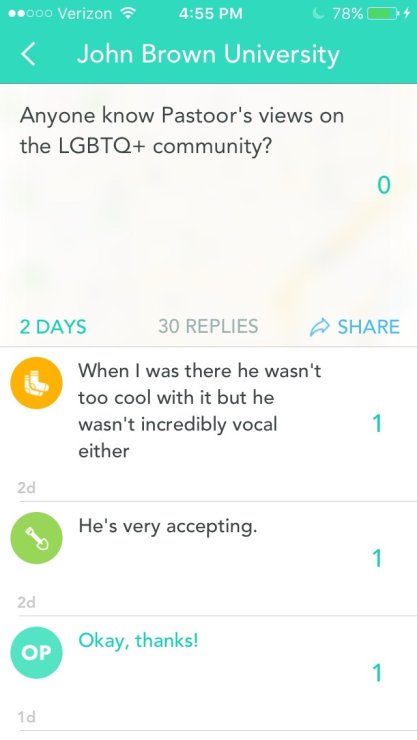
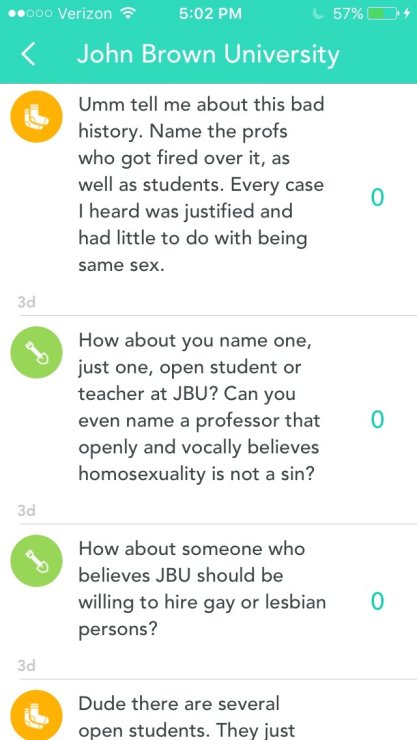
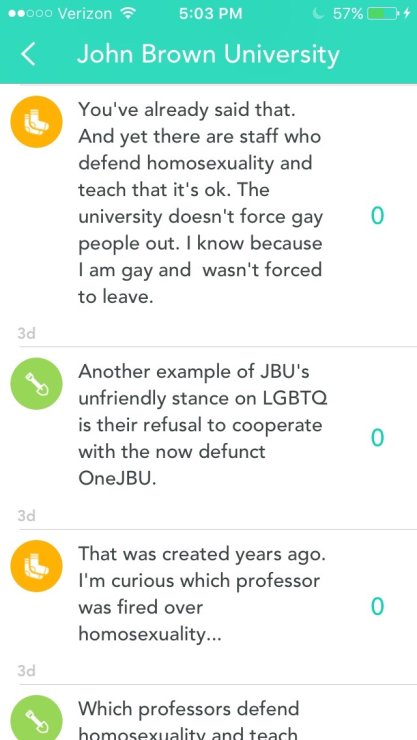
That these institutions’ decisions to ban Yik Yak have been less than effective is unsurprising. Other institutions have signaled a disinterest in policing for the same reason: banning Yik Yak is simply not practicable. Colgate University, for example, suggested that in “balancing security needs with the protection of privacy and freedom in education,” it wouldn’t be practical to block Yik Yak because doing so “would not preclude individuals from accessing and posting to Yik Yak.” Instead of banning Yik Yak, Colgate professors banded together, joined Yik Yak themselves, and added their own voices, with a goal of contributing positive dialogue to the community.
To be sure, it’s difficult to surmise an objective benchmark by which the overall effectiveness of banishing Yik Yak from campus Internet connections has been effective in either reducing traffic to the site or in curbing threats or offensive views. Yet, a brief review indicates that Yik Yak communities continue to thrive at some institutions, even after being blacklisted from the campus Internet connection.
Why have only private institutions banned Yik Yak?
As far as FIRE is aware, no public institution has blocked access to Yik Yak from its network. To do so would run afoul of the First Amendment—by which private institutions are not obligated to abide—because, as the Supreme Court has ruled, anonymity “exemplifies the purpose behind the Bill of Rights and of the First Amendment in particular: to protect unpopular individuals from retaliation … at the hand of an intolerant society.”
As the Electronic Frontier Foundation has argued at length, a public institution’s ban on Yik Yak would violate the First Amendment for a variety of reasons (footnotes omitted):
A school cannot place blanket restrictions on students that substantially burden their right to speak anonymously. Anonymous online communication is critical, given our nation’s history of government entities trying to silence unpopular organizations by exposing the identities of their members and supporters. “Anonymity is a shield from the tyranny of the majority,” according to the U.S. Supreme Court. Indeed, our founders relied on anonymity when creating the Constitution. Moreover, as courts have explained: “Internet anonymity facilitates the rich, diverse, and far ranging exchange of ideas. The ability to speak one’s mind on the Internet without the burden of the other party knowing all the facts about one’s identity can foster open communication and robust debate. [...]
Banning access to online platforms would greatly limit the tools students can use to speak, organize, and demonstrate in support of or against any number of political and social causes. Online platforms play an integral role in modern social justice and political movements, allowing people to communicate and organize in ways that are faster and more powerful than offline alternatives. That is why authoritarian regimes that lack strong free speech protections often seek to shut down Internet access or block such platforms. [...]
Commensurate with students’ right to speak anonymously, students also have the First Amendment right to gather and to receive information via online platforms. By excluding anonymous speech in such platforms, schools would unconstitutionally prevent some students from obtaining information from other students who will only express certain criticisms of the status quo using anonymous online platforms.
Institutions, public or private, may nonetheless feel pressure to ban Yik Yak (however futile) as a means of demonstrating their commitment to respecting Title IX, the law against sex discrimination in federally funded education programs—a category that includes nearly all colleges, public and private.
In May of 2015, a group of students filed a complaint against the University of Mary Washington (UMW) with the Department of Education’s Office for Civil Rights (OCR), asking the agency to open a Title IX investigation into UMW’s response to Yik Yak posts concerning students who had criticized a rugby club’s bawdry song. OCR opened an investigation, which remains pending. Meanwhile, a number of organizations wrote to OCR, asking that it issue guidance concerning online speech, and urging that it would be “appropriate” to “bar[] the use of campus wi-fi to view or post to” particular applications, including Yik Yak.
It would be difficult to expect colleges—even those not bound by the First Amendment—to police the broader Internet for offensive content and place on it restrictions. As FIRE has noted in a similar context:
The bottom line is that while schools are (correctly) legally required to respond to harassment on campus, whether that harassment be “in the real world,” on university-controlled websites, or with university-controlled e-mail addresses, it’s too much to ask that universities be responsible for the rest of the Web, too. It’s too big a job, it’s too problematic in terms of available remedies, and it’s an invitation to even worse speech abuses and speech codes. And, perhaps most importantly, it’s unnecessary. Again, it’s crucial to remember that students who feel victimized by nasty online speech have recourse to all the legal courses of action I outlined above: filing a criminal complaint against speech that reaches the threshold for incitement, intimidation, criminal harassment, or threat; or bringing a civil action for libel or defamation. Either way, students have methods of protecting themselves from truly harmful speech online without having to resort to asking their universities to intervene—a task for which those universities are thoroughly ill-suited.
Given that it’s impracticable (if not unlawful) to ban Yik Yak or similar sites or platforms—unless college administrators are keen to distribute lists of disapproved websites that must not be visited by students on their own networks—proponents of banning Yik Yak often argue that it is nevertheless symbolically important to respond to offensive (or threatening) speech by squelching the means by which the message was sent.
So if it’s just symbolic, why not ban it?
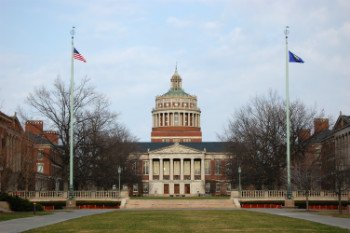
Most institutions faced with demands to ban Yik Yak have satisfied themselves with either banning the application or demurring that doing so would be ineffective in preventing threats or countering offensive speech. The president of the University of Rochester seems to be one of the few willing to reject the argument that, even if it would only be symbolic, it would still be worthwhile for an institution to ban Yik Yak in order to convey the message that it holds the messages sent there in contempt.
Throughout 2015, the University of Rochester’s students, administrators, and faculty debated the role Yik Yak plays on campus, following a number of posts containing racially-offensive language and violent imagery. In response, Rochester’s president created a panel of a cross-section of the campus community, asking for their feedback on racism on campus.
In January, the panel issued an interim report. The panel unanimously agreed on a number of responses to Yik Yak—including encouraging the app’s makers to be more responsive to concerns that their creation was being used to facilitate offensive or threatening speech—and fourteen members of the seventeen-member panel voted in favor of banning Yik Yak. Although the panel recognized that a ban would not prevent its use, the panel urged that doing so would be a “[s]ymbolic gesture that some students feel will show the University’s support for the injury caused by Yik Yak posts that are racist, misogynistic, disparaging of specific religions or otherwise highly offensive.”
University of Rochester president Joel Seligman, while accepting a majority of the panel’s recommendations, rejected the proposal to ban the app, siding with the dissenting members of the panel. Seligman recited, verbatim, the offensive Yik Yak posts that spurred much of the discussion. He condemned them, but argued that banning Yik Yak would not only be ineffective, but could be used as a future justification to undermine the institution’s commitment to academic freedom:
Banning Yik Yak is not merely a symbolic act. Academic freedom is also a core value of our University. If I were to ban Yik Yak from using the University’s wi-fi networks, I would begin a new and unbounded process by which my defense of the free expression rights of our faculty members, the student newspaper, speaker selection, faculty hiring would be undercut.
Seligman’s concern also holds true for other aspects of the Internet. Almost any social network can be used to send threatening or offensive messages. If Yik Yak is banned, why should an institution permit access to Twitter, which can similarly be used to dispatch offensive speech? Or, for that matter, why not Facebook?
Banning an app risks throwing the baby out with the bathwater. Irrespective of whether it would be appropriate or legal to ban Yik Yak or similar fora, any symbolism in null-routing Yik Yak isn’t worth the costs. There are more effective ways for colleges (including both administrators and students) to respond to offensive speech in a particular medium, and banning the entirety of the medium (if it were effectively banned) risks destroying a positive and constructive outlet for students to engage in meaningful, open discourse.
Even if it is simply a symbolic gesture, it may be an unproductive one. While it’s one thing to condemn particular statements made anonymously, blaming an app, website, or anonymous speech in general may discourage students from utilizing these tools to have frank and enlightening discussions about challenging issues. At the University of Oklahoma, then roiled by controversy over a video of frat brothers singing a racist song, a Washington Post reporter looked at what students were discussing on Yik Yak:
Amid the profanity, college pride and sex talk, people were discussing race on campus. Candidly.
Not all of the discussion is particularly sensitive or intelligent. But put this in perspective: This is an app created by two (white) frat brothers to promote a more “democratic” social network. It’s an anonymous space. The conversation is between college students who are also posting about the price of avocados and about sports. Given that, it’s surprising to see how real Yik Yak can get.
I’ve been lurking quietly on Yik Yak for months, and this is not the first time I’ve seen the conversation get more substantive. In December, as Black Lives Matter protesters took to the streets in D.C., people posted about the differences between the deaths of Michael Brown and Eric Garner.
Slate’s Amanda Hess offered a similar perspective, noting that “the anonymous messages it hosts are more mundane than offensive,” but offered students more than an opportunity to air their mundane thoughts:
Yik Yak’s anonymity does facilitate jerkiness. But it also encourages users to air risqué or taboo thoughts that they wouldn’t necessarily feel comfortable saying out loud. Like Craigslist before it, Yik Yak attracts people on the hunt for sex partners and drug buddies, but it also frees people to discuss their inability to orgasm or their experience being raped. Meanwhile, the intimacy of the geolocation feature inspires a communal vibe. Most yaks are boring on their face—it’s just strangers welcoming the weather or dreading final exams—but taken together, falling into the Yik Yak feed has the effect of opening an emotional connection with the people around you. That can serve as a powerful antidote to the alienation of a big city (or a massive college campus, or an oppressively cliquey high school).
And in Bloomberg, Virginia Postrel—a FIRE board member—wrote about her own exploration of Yik Yak, finding that anonymity also allowed students to express feelings that they might not be able to express in any other outlet:
Most striking is how the anonymity of Yik Yak creates a place of support and solidarity amid academic and social struggles. Shielded by anonymity, students give voice not just to the angry id that attracts condemnation and media notice but to the pain and insecurities they often won’t admit to their friends. [...]
“I have everything someone could ever want. And yet I’m still suicidal and always unhappy,” a UCLA student posted. “I feel the same way,” responded another, who added: “:( and then I feel [terrible] for being unhappy because other people have less and are happy so I feel like I shouldn’t complain. I realize that’s not how it works but still :(”. “Me too :(” another chimed in. Publicly confessing such thoughts might get you denounced as a “special snowflake.” In the anonymity of Yik Yak, you can find people who feel your pain and you can at least know you aren’t alone. [...]
To students feeling insecure and worthless, Yik Yak carries the message that they matter. Even anonymous strangers care about their well-being. “If people don’t appreciate/value me when I’m alive why should I care that they would care if I died?” wrote a Princeton student. Someone responded, “Hey, my best friend killed himself last year and he kept saying that no one appreciated or valued him but it just wasn’t true. If you really feel that way please go to CPS [the school’s counseling center]. There’s always someone in your life who you mean more to than you’ll ever know.”
When administrators squelch these channels of communication—whether the steps taken have a meaningful, practical impact or whether they simply discourage students from using channels which permit anonymous speech—something real, positive, and constructive may be lost.
Update (April 11, 2016): Rochester's president, in an exchange caught on video, defended his decision not to ban Yik Yak.
Recent Articles
FIRE’s award-winning Newsdesk covers the free speech news you need to stay informed.
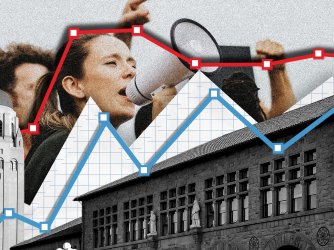
A third of Stanford students say using violence to silence speech can be acceptable

FIRE survey shows Judge Duncan shoutdown had ‘chilling effect’ on Stanford students

USC canceling valedictorian’s commencement speech looks like calculated censorship
